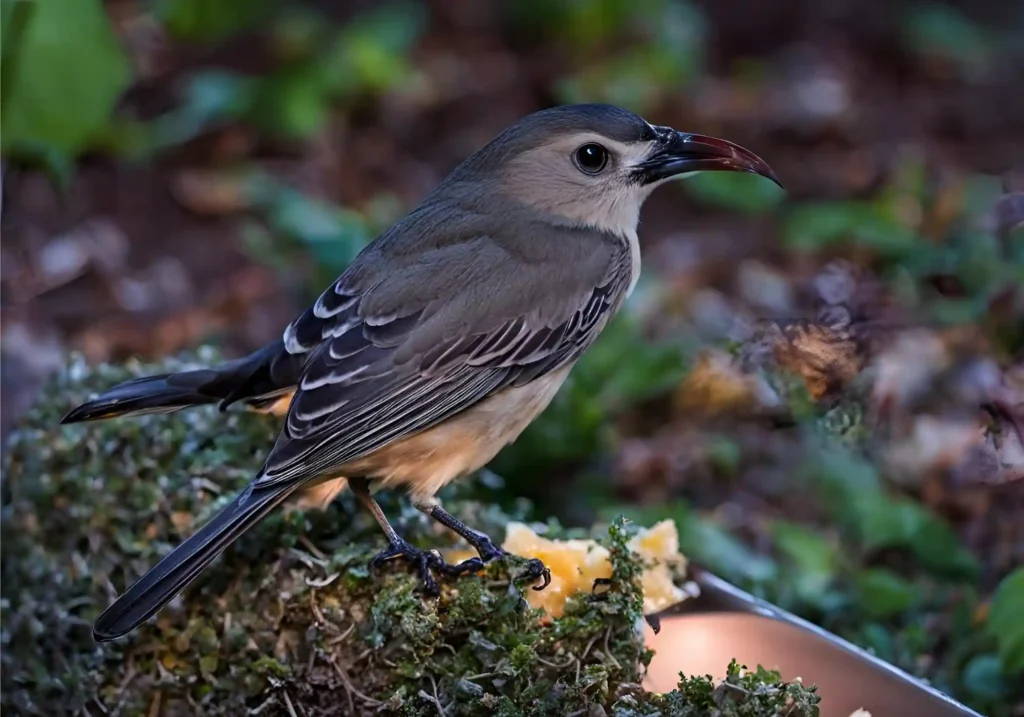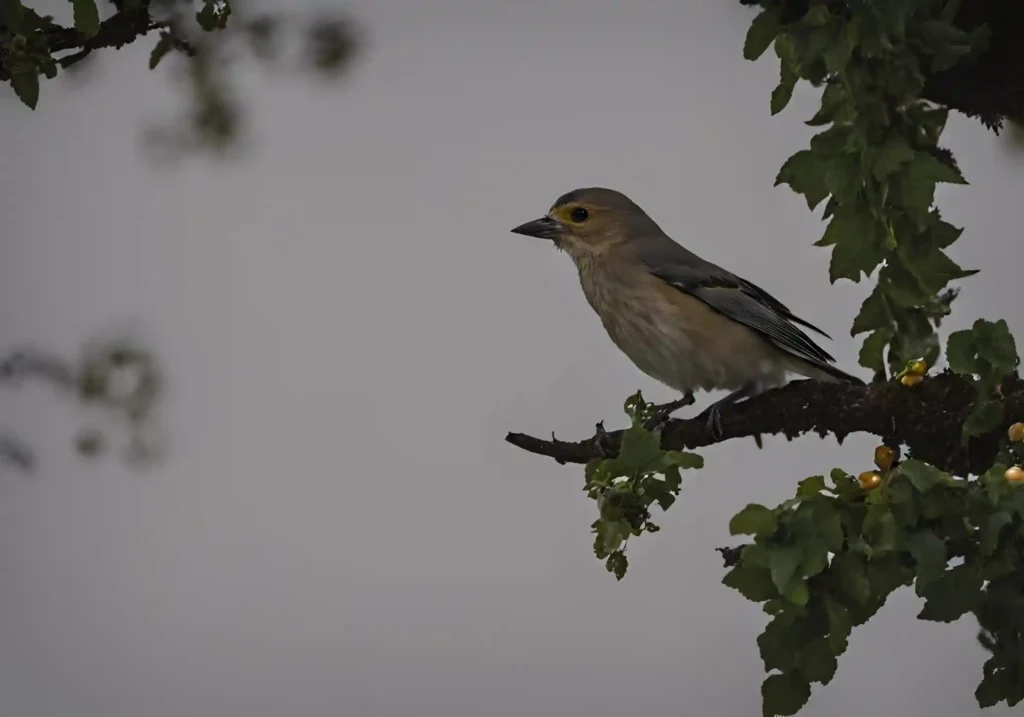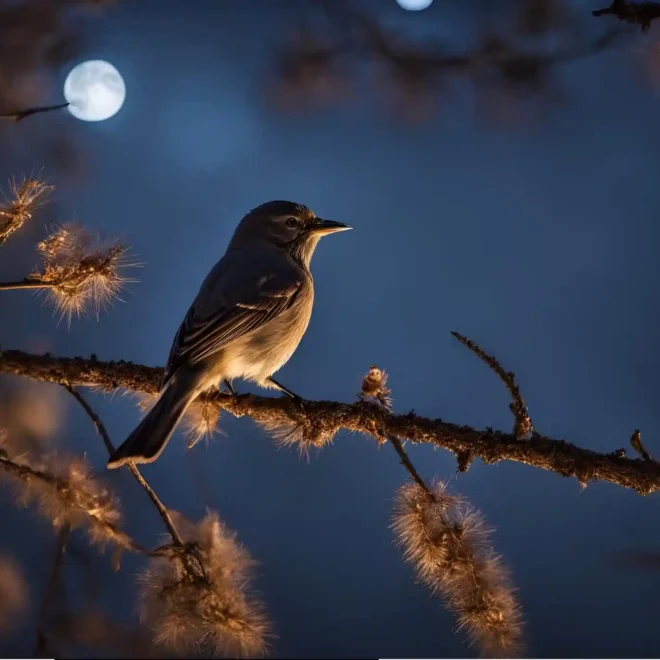Have you ever wondered if birds eat at night? We often see them busy during the day, searching for food and flying around. But what happens when the sun sets? Do they continue to hunt for food in the dark, or do they rest like we do?
It’s an interesting question that can make us look at our feathered friends in a whole new way. Let’s explore what birds do at night and whether they ever sneak in a late-night snack!
Can Birds Eat at Night?
Most birds are diurnal, meaning they are active during the day and sleep at night. As a result, most bird species do not eat at night because they rest after dusk. However, there are exceptions.
Nocturnal birds, such as owls and nightjars, hunt and feed during the night. These birds have adapted to low light conditions, and their diets often consist of insects, small mammals, and other nocturnal prey.
While it’s uncommon to see diurnal birds eating at night, environmental factors like artificial lighting or disturbances may cause them to search for food later than usual.
However, this behavior is more of an anomaly than a norm, and most birds wait until dawn to feed again.
Do Baby Birds Eat at Night?
Baby birds generally rely on their parents for food, and their feeding schedules largely depend on the activity of the parents.
During the first few days of life, baby birds may be fed more frequently, including late into the evening, as their parents work hard to provide them with nourishment.
However, once darkness falls, baby birds typically do not eat through the night because their parents need rest as well. Baby birds grow quickly, and feeding them during daylight hours is sufficient to keep them healthy.
While nocturnal species may have different patterns, most baby birds receive their food primarily during the day.
Do Birds Need to Be Fed at Night?
For the majority of birds, feeding at night is not necessary. Birds are active and foraging during the day, and they spend their nighttime hours roosting or sleeping.
Even pet birds in captivity do not need to be fed at night because they follow the same natural rhythms as their wild counterparts.
In some rare cases, if a bird is ill or injured, it might need extra attention and feeding, but for healthy birds, nighttime feeding is unnecessary.
For nocturnal birds like owls, however, nighttime is when they do their hunting and eating. But for most species, food consumption is restricted to the daylight hours.
What Time of Day Do Birds Eat the Most?
Birds are most active during the early morning hours, and this is when they do the majority of their feeding. At dawn, birds are hungry after a night of fasting, so they take advantage of the early light to search for food.
You’ll often notice a lot of activity around bird feeders during this time. As the day progresses, birds continue to eat, but their feeding slows down during the heat of the afternoon.
They tend to forage again later in the day, just before dusk, to ensure they have enough energy to last through the night. Therefore, the early morning and late afternoon are the peak times for bird feeding.
What Time Do Birds Eat at Night?

Typically, birds do not eat at night because most species are diurnal and spend the night resting. However, nocturnal birds like owls and nightjars begin hunting as the sun sets and continue feeding through the night.
These birds rely on their excellent night vision and hearing to find prey in the darkness. For diurnal birds, their feeding patterns are strongly tied to daylight, so they stop foraging and feeding as night falls.
In rare cases, artificial light can confuse diurnal birds, leading them to continue eating into the night, but this is not a normal or healthy behavior for them.
What Birds Eat at Night?
Nocturnal birds such as owls, nightjars, and certain species of bats that feed on insects are the primary feeders at night. These birds have adapted to be active during the night and hunt for food when it’s dark.
Owls, for example, hunt small mammals, insects, and sometimes other birds during the night using their sharp talons and excellent night vision. Nightjars, on the other hand, specialize in catching insects in mid-flight.
These nocturnal feeders are specialized to forage during the dark hours, unlike their diurnal counterparts, who are active and feed during the day.
Do Nocturnal Birds Eat Differently from Daytime Birds?
Yes, nocturnal birds have different feeding behaviors compared to diurnal birds. Birds that feed during the day rely on their sense of sight to locate food, while nocturnal birds like owls and nightjars depend on their enhanced night vision, acute hearing, and sometimes echolocation to find prey in the dark.
Nocturnal birds are typically predators and hunt for live prey such as insects, small mammals, and reptiles, while diurnal birds might eat seeds, fruits, and smaller insects.
The ability to hunt effectively in the dark gives nocturnal birds a unique advantage, allowing them to thrive in environments where diurnal birds cannot.
Do Owls Eat Only at Night?
Owls are mostly nocturnal hunters, and they do most of their feeding at night. They are specially adapted to hunt in darkness, using their excellent eyesight and keen hearing to locate prey.
Owls often hunt small mammals, such as mice and rats, but they also feed on birds, insects, and even fish, depending on the species. While the majority of owl species are nocturnal, there are a few exceptions, such as the Northern Hawk Owl, which hunts during the day.
However, for most owl species, nighttime is when they are most active and focused on feeding.
What Time Do Birds Stop Eating?
Birds usually stop eating around dusk as they prepare to roost for the night. As diurnal creatures, most birds follow the natural light cycle and will cease their feeding activities when the sun sets.
They then seek safe places to sleep and rest until the morning. In urban environments, artificial lighting may sometimes confuse birds, causing them to continue eating past their normal hours.
However, this is not typical, and most birds stop feeding well before nightfall. Nocturnal birds, on the other hand, start their feeding activities at dusk and continue hunting through the night.
Can You Feed Birds at Night?

Feeding birds at night is generally not necessary because most species are not active during this time. However, nocturnal birds such as owls and nightjars feed after sunset, so providing food for them during the evening could attract these nighttime hunters.
If you’re feeding diurnal birds, it’s best to offer food during daylight hours, particularly in the early morning or late afternoon when they are most active.
Leaving food out at night may attract unwanted visitors such as rodents or other nocturnal animals, which can be a problem if you’re trying to limit pests around your bird feeders.
Why Do Some Birds Eat Late at Night?
Birds that eat late at night are typically nocturnal species, such as owls, nightjars, and some species of herons. These birds are adapted to hunt and feed in the dark, using their keen senses to locate prey.
In urban environments, artificial lighting may sometimes confuse diurnal birds, causing them to eat later than usual. Additionally, certain species may eat at night during specific life stages, such as during migration or breeding, when they need extra energy.
However, for the vast majority of birds, nighttime is a period for rest, not feeding.
Do Hummingbirds Eat at Night?
Hummingbirds do not typically eat at night. These tiny birds have incredibly high energy needs, and they spend most of their day feeding on nectar to fuel their rapid wing beats.
At night, hummingbirds enter a state called torpor, which is a form of deep sleep that helps them conserve energy. However, in rare cases, if there is artificial lighting near a hummingbird feeder, they might continue feeding after dusk.
But under natural conditions, hummingbirds rest at night and resume feeding early in the morning when the sun rises.
Why Is My Bird Feeder Empty in the Morning?
If your bird feeder is empty in the morning, it could be due to nighttime visitors such as raccoons, squirrels, or even nocturnal birds like owls. While most daytime birds don’t feed at night, nocturnal creatures might take advantage of the food.
To prevent this, you can bring the bird feeder indoors at night or use deterrents like baffles to keep larger animals from accessing it.
Additionally, a high volume of bird activity during the day can also quickly empty feeders, so ensuring you’re filling the feeder adequately might also help.
What Time Do Birds Usually Feed?
Birds usually feed most actively in the early morning just after sunrise. This is when they are hungriest after fasting overnight. You’ll often see birds flocking to feeders or foraging for insects and seeds at this time.
They tend to take breaks during the hottest part of the day and will often feed again in the late afternoon, just before dusk, to store up energy for the night.
While birds do eat throughout the day, these two times—early morning and late afternoon—are when they are most likely to be seen actively feeding.
Do Pigeons Eat at Night?
Pigeons, like most birds, are diurnal, which means they are active and feed during the day. Once the sun sets, pigeons roost and rest for the night, and they do not usually eat after dark.
However, pigeons living in urban areas with artificial lighting may sometimes forage later in the evening, but this is not typical behavior. In general, pigeons, like most birds, stop feeding at dusk and resume their search for food in the morning.
Do Nocturnal Birds Like Nightjars Feed Only at Night?

Yes, nocturnal birds like nightjars are specially adapted to feed during the night. Nightjars are insectivores, meaning they feed primarily on flying insects such as moths and beetles, which are most active during the nighttime.
These birds have large eyes to help them see in the dark and wide mouths to capture insects mid-flight. Nightjars typically rest during the day and begin feeding at dusk, continuing through the night.
Their feeding behavior is a perfect example of adaptation to their nocturnal environment, ensuring they find enough food when other animals, including daytime birds, are not competing for the same resources. While nightjars are primarily active at night, they may occasionally hunt at dawn or dusk as well.
Do Birds Eat Insects at Night?
Most diurnal birds, which are active during the day, do not eat insects at night because they are resting. However, nocturnal birds like owls and nightjars do hunt and consume insects during the night.
These birds have evolved to take advantage of nighttime prey availability, especially flying insects that are active in the dark. Night-feeding birds rely on keen senses such as sight and hearing to locate their prey.
While insects form a significant part of many birds’ diets, only nocturnal species are adapted to hunting them during nighttime hours. Diurnal birds will typically resume their insect-eating activities at dawn.






